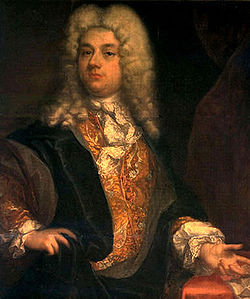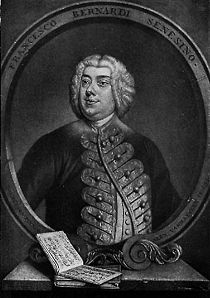
Senesino
Encyclopedia

Italian people
The Italian people are an ethnic group that share a common Italian culture, ancestry and speak the Italian language as a mother tongue. Within Italy, Italians are defined by citizenship, regardless of ancestry or country of residence , and are distinguished from people...
contralto
Contralto
Contralto is the deepest female classical singing voice, with the lowest tessitura, falling between tenor and mezzo-soprano. It typically ranges between the F below middle C to the second G above middle C , although at the extremes some voices can reach the E below middle C or the second B above...
castrato
Castrato
A castrato is a man with a singing voice equivalent to that of a soprano, mezzo-soprano, or contralto voice produced either by castration of the singer before puberty or one who, because of an endocrinological condition, never reaches sexual maturity.Castration before puberty prevents a boy's...
, particularly remembered today for his long collaboration with the composer George Frideric Handel
George Frideric Handel
George Frideric Handel was a German-British Baroque composer, famous for his operas, oratorios, anthems and organ concertos. Handel was born in 1685, in a family indifferent to music...
.
Early life and career
Senesino was the son of a barber from SienaSiena
Siena is a city in Tuscany, Italy. It is the capital of the province of Siena.The historic centre of Siena has been declared by UNESCO a World Heritage Site. It is one of the nation's most visited tourist attractions, with over 163,000 international arrivals in 2008...
(hence his stage-name). He joined the cathedral choir there in 1695 and was castrated at the comparatively late age of thirteen. His debut was at Venice
Venice
Venice is a city in northern Italy which is renowned for the beauty of its setting, its architecture and its artworks. It is the capital of the Veneto region...
in 1707, and during the next decade he acquired a European reputation and, by the time he sang in Lotti's Giove in Argo in 1717 at Dresden, a commensurately enormous salary.
As with many castrati, reports of Senesino's acting were not always positive, to say the least. The impresario Count Francesco Zambeccari wrote of his performance in Naples in 1715: "Senesino continues to comport himself badly enough; he stands like a statue, and when occasionally he does make a gesture, he makes one directly the opposite of what is wanted". Of the singer's vocal abilities, however, there was no doubt. In 1719, the composer Quantz heard him in Lotti's Teofane at Dresden, and stated: "He had a powerful, clear, equal and sweet contralto voice, with a perfect intonation and an excellent shake. His manner of singing was masterly and his elocution unrivalled. … he sang allegros with great fire, and marked rapid divisions, from the chest, in an articulate and pleasing manner. His countenance was well adapted to the stage, and his action was natural and noble. To these qualities he joined a majestic figure; but his aspect and deportment were more suited to the part of a hero than of a lover."
Senesino and Handel

Johann David Heinichen
Johann David Heinichen was a German Baroque composer and music theorist who brought the musical genius of Venice to the court of Augustus the Strong in Dresden...
in 1720, which led to his dismissal, Senesino was engaged by Handel as primo uomo (lead male singer) in his company, the Royal Academy of Music. He made his first appearance in a revival of Radamisto on 28 December, and his salary was variously reported as between £2000 and 3000 guineas: both vast sums. Senesino remained in London for much of the succeeding sixteen years. He became a friend and associate of many in the highest levels of society. He became friendly with, among others, the Duke of Chandos
James Brydges, 1st Duke of Chandos
James Brydges, 1st Duke of Chandos, MP, PC was the first of fourteen children by Sir James Brydges, 3rd Baronet of Wilton Castle, Sheriff of Herefordshire, 8th Baron Chandos; and Elizabeth Barnard...
, Lord Burlington
Richard Boyle, 3rd Earl of Burlington
Richard Boyle, 3rd Earl of Burlington and 4th Earl of Cork PC , born in Yorkshire, England, was the son of Charles Boyle, 2nd Earl of Burlington and 3rd Earl of Cork...
and the landscape designer William Kent
William Kent
William Kent , born in Bridlington, Yorkshire, was an eminent English architect, landscape architect and furniture designer of the early 18th century.He was baptised as William Cant.-Education:...
, while amassing a fine collection of paintings, rare books, scientific instruments, and other treasures, including a service of silver made by the famous Paul de Lamerie
Paul de Lamerie
Paul de Lamerie was an English silversmith. The Victoria and Albert Museum describes him as the "greatest silversmith working in England in the 18th century". Though his mark raises the market value of silver, his output was large and not all his pieces are outstanding...
.
Though creating seventeen leading roles for Handel (including Giulio Cesare
Giulio Cesare
Giulio Cesare in Egitto , commonly known simply as Giulio Cesare, is an Italian opera in three acts written for the Royal Academy of Music by George Frideric Handel in 1724...
, Orlando
Orlando (opera)
Orlando is an opera seria in three acts by George Frideric Handel written for the Royal Academy of Music . The Italian-language libretto was adapted from Carlo Sigismondo Capece's L'Orlando after Ludovico Ariosto's Orlando Furioso, which was also the source of Handel's operas Alcina and...
, and Bertarido in Rodelinda), his relationship with the composer was frequently stormy: "the one was perfectly refractory; the other was equally outrageous", according to the contemporary historian Mainwaring. After the break-up of Handel's Royal Academy in 1728, Senesino sang in Paris (1728) and Venice (1729), but was re-engaged by Handel in 1730, singing in four more new operas and in the oratorios Esther, Deborah
Deborah (Handel)
Deborah is an oratorio by George Frideric Handel. It was one of Handel's very early oratorios and was based on a libretto by Samuel Humphreys. It received its premiere performance at the King's Theatre in London on 17 March 1733....
, and, in its 1732 bilingual version, Acis and Galatea. His antipathy to Handel eventually became so great that, in 1733, Senesino joined the rival Opera of the Nobility
Opera of the Nobility
The Opera of the Nobility was an opera company set up and funded in 1733 by a group of nobles opposed to George II of England, in order to rival the Second Royal Academy of Music company under Handel .Nicola Porpora was invited to be its musical director and Owen Swiny considered as its talent scout...
. Thus he came to sing alongside the great soprano
Soprano
A soprano is a voice type with a vocal range from approximately middle C to "high A" in choral music, or to "soprano C" or higher in operatic music. In four-part chorale style harmony, the soprano takes the highest part, which usually encompasses the melody...
castrato
Castrato
A castrato is a man with a singing voice equivalent to that of a soprano, mezzo-soprano, or contralto voice produced either by castration of the singer before puberty or one who, because of an endocrinological condition, never reaches sexual maturity.Castration before puberty prevents a boy's...
Farinelli
Farinelli
Farinelli , was the stage name of Carlo Maria Broschi, celebrated Italian castrato singer of the 18th century and one of the greatest singers in the history of opera.- Early years :...
, and their meeting on stage (in the pasticcio Artaserse) led to a famous incident, reported by the music historian Charles Burney
Charles Burney
Charles Burney FRS was an English music historian and father of authors Frances Burney and Sarah Burney.-Life and career:...
.

